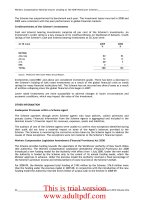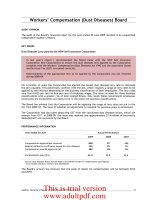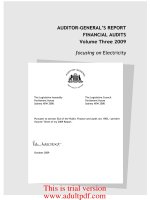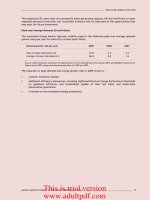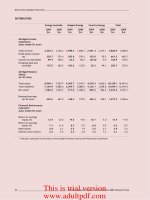New South Wales Auditor-General’s Report Financial Audit Volume Nine 2011 Focusing on Education and Communities_part4 pot
Bạn đang xem bản rút gọn của tài liệu. Xem và tải ngay bản đầy đủ của tài liệu tại đây (120.6 KB, 11 trang )
32
NSW Auditor
-
General's Report
Volume Nine 2011
LIBRARY COUNCIL
OF NEW
SOUTH WALES
Workforce Ageing (Repeat Issue)
Recommendation
I again recommend the Library review the effectiveness of its policies in managing its ageing
workforce.
Last year, I recommended the Library review the effectiveness of its policies in managing its
ageing workforce. No progress was made on this issue in 2010–11. The Library advises it is
currently investigating strategies to address its workforce planning needs, including its ageing
workforce.
Flex Leave
Last year, I recommended the Library implement a centralised system for monitoring flex
leave arrangements. The Library advises it has completed the first of two scheduled audits of
flex sheets. The findings of the first audit have been submitted to the Library Executive and an
action plan to address the findings has been prepared.
Use of Contract Staff
Last year, I recommended the Library periodically review the roles and responsibilities of all
contract employees. The Library advises a register is now in place, which is monitored
regularly to ensure the use of contractors is appropriate.
Financial Information
Abridged Statements of Comprehensive Income
Year ended 30 June
Consolidated Parent
2011
$’000
2010
$’000
2011
$’000
2010
$’000
Government contributions
80,128
77,878
80,128
77,878
Other revenue
11,863
9,549
10,662
7,984
Total Revenue
91,991
87,427
90,790
85,862
Personnel services expenses
29,628
28,804
29,113
28,329
Other expenses
57,698
57,101
57,375
56,904
Total Expenses
87,326
85,905
86,488
85,233
Surplus
4,665
1,552
4,302
629
Other Comprehensive Income
Collection revaluation
271,082
271,082
Total Other Comprehensive Income
271,082
271,082
Total Comprehensive Income
4,665
272,604
4,302
271,711
Other revenue increased during 2010–11 due to the receipt of a $2.0 million corporate
donation, which will be used to help fund the $7.4 million needed to acquire one of the largest
archives of the First Fleet period, comprising 741 natural history watercolours. Further funding
of $1.0 million from the corporate donor and $2.5 million from the New South Wales
Government has been received since 30 June 2011 for the acquisition. The acquisition will be
known as the ‘TAL & Dai-ichi Life Collection’ in honour of its corporate sponsors.
The Library also received additional government funding during the year for the eRecords
project and the Gibran exhibition.
The Library does not have the authority to employ staff. It recognises personnel services
expenses for employees provided by the Department of Trade and Investment, Regional
Infrastructures and Services.
This is trial version
www.adultpdf.com
33
NSW Auditor
-
General's Report
Volume Nine 2011
LIBRARY COUNCIL
OF NEW
SOUTH WALES
Abridged Statements of Financial Position
At 30 June
Consolidated Parent
2011
$’000
2010
$’000
2011
$’000
2010
$’000
Current assets
35,596
27,937
23,259
16,029
Non-current assets
2,371,080
2,375,067
2,370,836
2,374,750
Total Assets
2,406,676
2,403,004
2,394,095
2,390,779
Current liabilities
7,681
8,674
7,631
8,617
Total Liabilities
7,681
8,674
7,631
8,617
Net Assets
2,398,995
2,394,330
2,386,464
2,382,162
The increase in current assets is due to increased cash and investment balances related to
the Government grants and donations mentioned above.
Library Activities
The Library is constituted under the Library Act 1939. It is subject to the control and direction
of the Minister for the Arts.
For further information on the Library, refer to www.sl.nsw.gov.au
.
Controlled Entity
The following controlled entity has not been reported on separately as it is not considered
material by its size or the nature of its operations to the consolidated entity.
Entity Name
Website
State Library of New South Wales Foundation
www.sl.nsw.gov.au/about/support/foundation/about
_foundation.html
This is trial version
www.adultpdf.com
34
NSW Auditor
-
General's Report
Volume Nine 2011
SYDNEY OPERA
HOUSE
TRUST
Audit Opinion
The audit of the Trust’s financial statements for the year ended 30 June 2011 resulted in an
unmodified audit opinion within the Independent Auditor’s Report.
Operational Snapshot
The Trust manages and maintains the Sydney Opera House, a heritage asset and Australian
cultural icon. The Trust produces and presents performing arts from Australia and overseas,
including dance, music, talks, opera and theatre. In 2010–11, the Trust presented 1,795
performances, attracting attendance of over 1.3 million people. Additional revenue is derived
from venue hire, tours and outsourced catering facilities.
In 2010–11, the Trust’s income totalled $120 million and included government contributions of
$45.7 million. Expenses were $125 million, resulting in an operating deficit of $5.0 million for
the year.
Key Issues
Stage Machinery, Building Maintenance and Upgrade
In 2008–09, I recommended that critical problems with stage machinery at the Sydney Opera
House be addressed and consideration be given to other operational shortcomings. The Trust
advises it needs additional government funding to bring the machinery up to the desired
standard.
The Trust considers that after 40 years of use, the Sydney Opera House faces issues
including flawed acoustics, limited accessibility, limited seating and restricted spaces, and
shortcomings in meeting occupational health and safety requirements.
The Trust has developed a plan to progressively address these issues in the years leading up
to 2023. The plan calls for $1.1 billion in additional government funding from 2014 to 2023.
Discounted in today’s dollars this amounts to $785 million. No internal funding is available,
given the Trust’s operations already rely on government funding, primarily for building
maintenance and security.
The chart below shows how the Trust plans to spend this funding, if received.
Source: Sydney Opera House Trust (unaudited).
0
50
100
150
200
250
300
350
2012
2013
2014
2015
2016
2017
2018
2019
2020
2021
2022
2023
$m
Year ended 30 June
Estimated Project Costs
Additional funding required
Sydney Opera House Trust
The Sydney
Opera
House
needs $1.1
billion
to upgrade its
facilities to remain
viable and to
address access
and safety
concerns
This is trial version
www.adultpdf.com
35
NSW Auditor
-
General's Report
Volume Nine 2011
SYDNEY OPERA
HOUSE
TRUST
Performance Information
Management of Events
The Trust provided the following information regarding its operations:
Year ended 30
June 2011
2010
2009
2008
2007
Performances
1,795
1,679
1,677
1,661
1,595
Audience (’000s)
1,319
1,272
1,242
1,270
1,212
Source: Sydney Opera House Trust / Capital Annual Report 2010–11 (unaudited).
In 2010–11, performances held increased by 6.9 per cent and attendees by 3.7 per cent
compared to 2009–10. The Trust reports revenue from performances as income from the sale
of goods and services, which increased by 20.7 per cent from $51.3 million to $61.9 million in
2010-11.
The Trust tracks the costs, revenues and profitability of individual events, but considers this
information to be commercially sensitive.
Other Information
Vehicle Access and Pedestrian Safety Project
On 6 June 2010, the New South Wales Government announced a grant of $152 million to the
Trust to fund its Vehicle Access and Pedestrian Safety Project. It aims to improve tourist and
visitor safety by removing heavy vehicle movements from the forecourt to a new underground
loading dock. It involves three major undertakings:
x diversion of the Bennelong drain; a stormwater drain servicing parts of the Sydney CBD
that runs across the Sydney Opera House site. This was recently completed
x excavation of a new access road and loading dock under the forecourt and vehicle
concourse
x remediation of the existing road to remove the kerbs that regularly trip and injure
pedestrians.
Source: Sydney Opera House Trust (unaudited).
The on-site start date was delayed to accommodate the Oprah visit. Additional time has been
allocated to the tunnelling works required under Sydney Opera House so as not to disrupt the
busy schedule of events over the next three to four years.
0
20
40
60
80
100
120
2011
2012
2013
2014
%
Year ended 30 June
Projected Progress of the Vehicle Access and Pedestrian Safety
Project
Initial planned % of completion
Revised planned % of completion
This is trial version
www.adultpdf.com
36
NSW Auditor
-
General's Report
Volume Nine 2011
SYDNEY OPERA
HOUSE
TRUST
Consultants Review
Last year, the Trust engaged Boston Consulting Group to undertake an efficiency and
strategy review to assess options for future operating models to improve operational and
commercial performance. The results identified opportunities in retail; food and beverage
operations; marketing and new performance revenue; improvements to the tourism
experience; reinforcement of the programming identity; and addressing organisational
complexities.
Based on the report, management restructured operations, making 20 full time positions
redundant. Redundancy expenses totalled $1.6 million in 2010–11.
Annual Leave Balances
Last year, I recommended the Trust take steps to reduce excessive leave balances. Under
the Sydney Opera House Enterprise Agreement, certain employees can accrue up to ten
weeks annual leave. The Trust advises that the number of employees with leave balances in
excess of their maximum entitlement decreased from 49 employees at 30 June 2010 to 38
employees at 30 June 2011.
Financial Information
Abridged Statement of Comprehensive Income
Year ended 30 June
2011
$’000
2010
$’000
Sales of goods and services
61,928
51,300
Government contributions
45,715
43,456
Other
12,203
9,288
Total Revenue
119,846
104,044
Personnel services expenses
42,601
39,183
Other operating and maintenance expenses
66,939
62,241
Depreciation and amortisation
15,313
17,008
Total Expenses
124,853
118,432
Deficit
5,007
14,388
Other Comprehensive Income/(Expense)
Revaluation of land, property and internal fit outs
21,896
350,063
Unrealised gains/(losses) on forward exchange contracts
266
(189)
Total Other Comprehensive Income
22,162
349,874
Total Comprehensive Income
17,155
335,486
The increased revenue from the sale of goods and services resulted from more performances
held in 2011. Personnel services and other operating expenses also increased mainly for the
same reason.
Government contributions of $45.7 million ($43.5 million) included $14.3 million ($14.4 million)
for operating expenses and $29.5 million ($29.0 million) for strategic asset maintenance.
This is trial version
www.adultpdf.com
37
NSW Auditor
-
General's Report
Volume Nine 2011
SYDNEY OPERA
HOUSE
TRUST
Abridged Statement of Financial Position
At 30 June
2011
$’000
2010
$’000
Current assets
59,981
59,967
Non-current assets
2,126,078
2,105,238
Total Assets
2,186,059
2,165,205
Current liabilities
33,701
29,895
Non-current liabilities
1,282
1,389
Total Liabilities
34,983
31,284
Net Assets
2,151,076
2,133,921
The increase in non-current assets in 2010–11 primarily reflects an increment of $21.9 million
in the valuation of the Trust’s plant and equipment.
Trust Activities
The Trust is constituted under the Sydney Opera House Trust Act 1961. It is subject to the
control and direction of the Minister for the Arts.
For further information on the Trust, refer to www.sydneyoperahouse.com
.
This is trial version
www.adultpdf.com
38
NSW Auditor
-
General's Report
Volume Nine 2011
TRUSTEES OF
THE MUSEUM
OF APPLIED ARTS AND
SCIENCES
Audit Opinion
The audit of the Museum’s financial statements for the year ended 30 June 2011 resulted in
an unmodified audit opinion within the Independent Auditor’s Report.
Operational Snapshot
The Museum comprises the Powerhouse Museum, the Sydney Observatory, the Powerhouse
Discovery Centre and the NSW Migration Heritage Centre. The Museum’s collections include
history, science, technology, design, industry, decorative arts, music, transport and space
exploration. It is also home to heritage items and stories of Australian culture, history and
lifestyle.
In 2010-11, the Museum had total expenditure of $45.3 million and made a surplus of
$3.3 million.
Performance Information
The table below shows the number of visitors to the Museum’s sites over the last five years.
Visitor number’s (‘000s) per location
Year ended 30 June
2011 2010 2009 2008
2007
Powerhouse Museum
456
474
565
527
447
Sydney Observatory
179
181
139
134
163
Powerhouse Discovery
19
17
15
14
12
Total
654
672
719
675
622
Source: Trustees of the Museum of Applied Arts and Science Annual Report 2011 (unaudited).
The number of visitors to the Powerhouse Museum in 2010–11 was 3.8 per cent below the
previous year and 8.3 per cent below target, representing the second year of decline. Visitor
numbers were affected by the closure of six temporary exhibitions due to capital works and
the fact that there was no ‘blockbuster’ exhibition during the year. The higher visitor numbers
to the Powerhouse Museum in 2007–08 and 2008–09 were a result of the successful Star
Wars exhibition.
The Sydney Observatory visitor numbers continue to exceed target and remained at
historically high levels, whilst the Powerhouse Discovery Centre continued to experience
increasing visitation.
The Museum also provided the following information regarding its performance.
Year ended 30 June
2011 2010 2009 2008 2007
Revenue from Admission Fees ($m)
3.2
2.8
4.3
4.3
3.1
Temporary Exhibitions
10
19
23
24
31
Collections
- Items donated ($’000)
468
664
958
904
720
- Items acquired ($’000)
303
1,058
892
1,588
1,222
Total value of additions this year
($’000)
771
1,772
1,850
2,492
1,942
- Number of items added this year
317
871
414
889
725
Total Value of Collection ($m)
398
397
407
405
403
Source: Trustees of the Museum of Applied Arts and Science Annual Report 2010–11 (unaudited).
Trustees of the Museum of Applied
Arts and Sciences
Visitors to the
Powerhouse
Museum fell by
19.3 per
cent in
the past two
years
This is trial version
www.adultpdf.com
39
NSW Auditor
-
General's Report
Volume Nine 2011
TRUSTE
ES OF
THE MUSEUM
OF APPLIED ARTS AND
SCIENCES
In 2010–11, there was a significant reduction in the number of temporary exhibitions as a
result of the revitalisation project and associated necessary closures. The five year trend
shows a dramatic decrease in the number of exhibitions held. The Powerhouse Museum
relies on its ability to hold a ‘blockbuster’ event in order to draw in visitors and associated
revenues.
In 2010–11, the value of collection items donated was 70 per cent below the five-year
average; the number of items acquired was 50.7 per cent below average; and the value of
items acquired was 59.2 below the five year average.
Exhibition Analysis
The financial results of the Museum’s last five paid exhibitions are discussed below.
Revenue and Expenditure
The table below summarises the revenue and expenditure for the last five exhibitions with
paid admission.
Source: Information provided by the Museum.
When preparing its budget for each exhibition, the Museum does not take into account staff
salaries and wages and corporate overheads. As a result, the expenses are likely to be
understated.
The Lord of the Rings exhibition held in 2003–04 was the most successful exhibition in recent
years. The Star Wars exhibition was also popular whilst other major exhibitions held in recent
years did not generate a surplus.
The Museum held the ‘Top Secret’ and ‘ABBA’ exhibitions in 2010–11, initially as paid
exhibitions. The Museum subsequently opened these exhibitions to visitors free of charge as
public interest was below expectation. Revenues generated did not cover the costs for either
exhibition.
The Museum opened the Harry Potter Exhibition in November 2011. It is expecting this
exhibition to be popular and generate significant funding.
0
1
2
3
4
5
6
7
Star Wars
(2008)
Special Effects
(2007)
Diana
(2007)
Great Wall of China
(2006)
Lord of the Rings
(2004)
$m
Revenue
Expenditure
The decrease in
the number of
exhibitions held by
the Powerhouse
Museum led to
reduced
admissions
In 2010
–
11, the
Powerhouse
Museum’s
collection
acquisition
program slowed
significantly
This is trial version
www.adultpdf.com
40
NSW Auditor
-
General's Report
Volume Nine 2011
TRUSTEES OF
THE MUSEUM
OF APPLIED ARTS AND
SCIENCES
Decreasing cash balances
At 30 June 2011, the Museum held $15.5 million in financial investments, comprising
$462,000 in cash, $9.9 million in short-term deposits and $5.1 million in long-term
investments. Included in these amounts was $4.6 million of capital grants to be utilised in
2011–12. The Museum’s forward estimates indicate a 58 per cent reduction in cash balances
over the next four years. As a result, the Museum may have to utilise the majority of its short-
term deposits to fund operational activities.
The following chart shows the forecast decrease in cash balances to 2014–15.
Other Information
Human Resources
Last year, I made recommendations to the Museum regarding the management of annual
leave balances and the use of contract staff. Comments on the progress of these
recommendations follow.
Annual Leave Balances
Last year, I recommended that the Museum implement procedures to reduce leave balances.
The Museum advised that leave balances are reviewed on a quarterly basis. Employees with
excessive balances are required to develop leave plans to reduce the excess balance.
The number of employees with annual leave balances in excess of 40 days increased from
35 employees (11.8 per cent) at 30 June 2010 to 38 employees (12.5 per cent) at
30 June 2011. Two employees had leave balances in excess of 60 days at 30 June 2011 (six
at 30 June 2010).
-
2,000
4,000
6,000
8,000
10,000
12,000
14,000
16,000
18,000
2011
2012
2013
2014
2015
$'000
Year ended 30 June
Net Decrease in Cash
Cash Balance
This is trial version
www.adultpdf.com
41
NSW Auditor
-
General's Report
Volume Nine 2011
TRUSTEES OF
THE MUSEUM
OF APPLIED ARTS AND
SCIENCES
Use of Contract Staff
Last year, I recommended the Museum periodically review the roles and responsibilities of all
contract employees to ensure:
x reliance on contractors is not excessive
x use of contract employees instead of permanent employees is appropriate
x contractors do not become de facto employees by virtue of being with the Museum for an
extended period of time.
The Museum advised that contracts for temporary staff are reviewed at the time of renewal,
by the Director, and during the Museum's budget development process. Efforts are made to
minimise the number of employees on temporary contracts.
Financial Information
Abridged Statement of Comprehensive Income
Year ended 30 June
2011
$'000
2010
$'000
Government contributions
37,467
34,021
Sales of goods and services
5,234
4,763
Other
5,900
4,050
Total Revenue
48,601
42,834
Personnel services expenses
27,379
25,470
Other operating expenses
12,968
12,350
Depreciation and amortisation
4,943
5,872
Other losses
3
173
Total Expenses
45,293
43,865
Surplus/(Deficit)
3,308
(1,031)
Other Comprehensive Income
Gain on revaluation of property, plant and equipment, and collections
20,825
Total Other Comprehensive Income
20,825
Total Comprehensive Income
3,308
19,794
In 2010–11, government contributions increased by $3.4 million. This increase was due to
additional capital funding for the ‘Revitalisation’ program. This program includes
redevelopment of the main entrance, the creation of new temporary exhibition space, and the
opening of the shop and café to the forecourt.
This is trial version
www.adultpdf.com
42
NSW Auditor
-
General's Report
Volume Nine 2011
TRUSTEES OF
THE MUSEUM
OF APPLIED ARTS AN
D
SCIENCES
Abridged Statement of Financial Position
At 30 June
2011
$'000
2010
$'000
Current assets
12,100
9,102
Non-current assets
555,816
554,819
Total Assets
567,916
563,921
Current liabilities
6,717
6,031
Non-current liabilities
33
32
Total Liabilities
6,750
6,063
Net Assets
561,166
557,858
The increase in current assets in 2010–11 was mainly due to a higher cash balance at
year-end.
Museum Activities
The Museum is constituted under the Museum of Applied Arts and Sciences Act 1945. Under
the Act, the Trustees are subject to the control and direction of the Minister for the Arts.
For further information on the Museum, refer to www.powerhousemuseum.com
.
This is trial version
www.adultpdf.com



